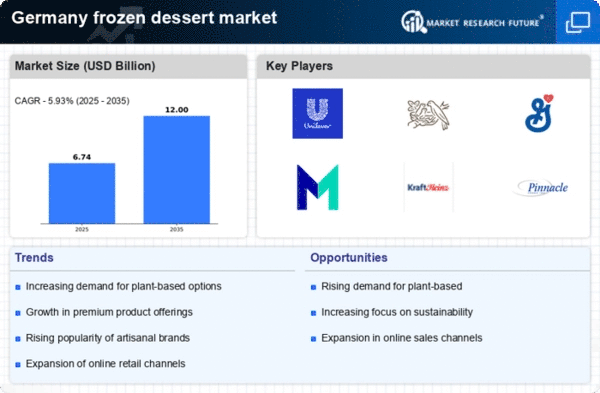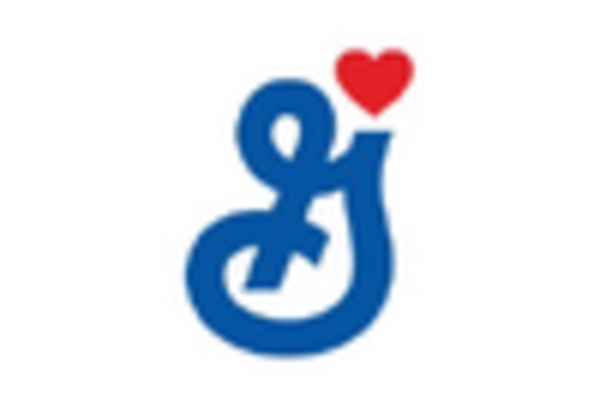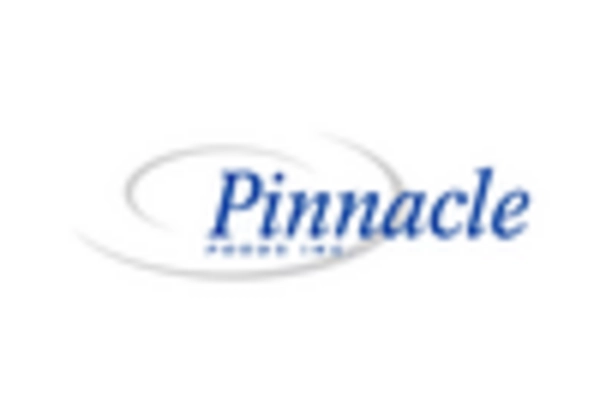Health and Wellness Trends
The health and wellness movement is significantly impacting the frozen dessert market in Germany. Consumers are increasingly seeking products that align with their health goals, leading to a rise in demand for lower-calorie, lower-sugar, and functional frozen desserts. Recent surveys indicate that approximately 35% of consumers are actively looking for healthier dessert options, prompting manufacturers to reformulate existing products and introduce new lines that cater to this demand. This trend is not only about reducing sugar content but also about incorporating functional ingredients such as probiotics and superfoods. As the focus on health continues to grow, the frozen dessert market is likely to see an influx of innovative products designed to meet the needs of health-conscious consumers, thereby reshaping the competitive landscape.
Innovative Flavor Profiles
Innovation in flavor profiles is becoming a key driver in the frozen dessert market in Germany. Consumers are increasingly seeking unique and exotic flavors that go beyond traditional offerings. This trend is supported by Market Research Future indicating that approximately 40% of consumers are willing to try new flavors, particularly those inspired by global cuisines. As a result, manufacturers are experimenting with ingredients such as matcha, lavender, and even savory elements like herbs and spices. This diversification not only attracts adventurous eaters but also encourages repeat purchases, as consumers are drawn to the novelty of trying something new. The emphasis on innovative flavors is likely to shape product development strategies within the frozen dessert market, pushing brands to differentiate themselves in a competitive landscape.
Convenience and On-the-Go Consumption
The fast-paced lifestyle of consumers in Germany is significantly influencing the frozen dessert market. There is a growing preference for convenient, ready-to-eat options that cater to on-the-go consumption. Recent statistics suggest that around 60% of consumers prioritize convenience when selecting frozen desserts, leading to an increase in single-serve packaging and portable formats. This trend is particularly appealing to busy professionals and families looking for quick dessert solutions. As a result, manufacturers are adapting their product lines to include more convenient options, such as ice cream bars and cups, which are easy to consume without the need for additional utensils. This focus on convenience is likely to continue shaping the frozen dessert market, as brands strive to meet the evolving needs of their consumers.
Rising Demand for Plant-Based Options
The frozen dessert market in Germany is experiencing a notable shift towards plant-based offerings. This trend is driven by an increasing number of consumers seeking healthier and more sustainable alternatives to traditional dairy products. According to recent data, the plant-based segment within the frozen dessert market has grown by approximately 25% over the past year. This growth is indicative of a broader movement towards veganism and flexitarian diets, which are gaining traction among various demographics. As consumers become more health-conscious, the demand for frozen desserts made from almond, coconut, and soy milk is likely to continue rising. This shift not only reflects changing dietary preferences but also highlights the potential for innovation within the frozen dessert market, as manufacturers explore new flavors and formulations to cater to this expanding consumer base.
Seasonal and Limited-Edition Offerings
Seasonal and limited-edition offerings are becoming a prominent driver in the frozen dessert market in Germany. Consumers are increasingly drawn to products that evoke a sense of exclusivity and novelty, particularly during festive seasons. Market data indicates that sales of limited-edition flavors can increase by up to 30% during peak seasons, such as summer and winter holidays. This trend encourages brands to launch unique flavors that resonate with seasonal themes, such as pumpkin spice in autumn or refreshing fruit sorbets in summer. By creating a sense of urgency and excitement around these offerings, manufacturers can boost sales and enhance brand loyalty. The emphasis on seasonal products is likely to remain a strategic focus within the frozen dessert market, as companies seek to capitalize on consumer enthusiasm for new and exciting flavors.
















